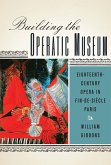Approaches the topic of classical music in the GDR from an interdisciplinary perspective, questioning the assumption that classical music functioned purely as an ideological support for the state.
Classical music in the German Democratic Republic is commonly viewed as having functioned as an ideological support or cultural legitimization for the state, in the form of the so-called "bourgeois humanist inheritance." The largenumbers of professional orchestras in the GDR were touted as a proof of the country's culture. Classical music could be seen as the polar opposite of Americanizing pop culture and also of musical modernism, which was decried as formalist. Nevertheless, there were still musical modernists in the GDR, and classical music traditions were not only a prop of the state.
This collection of new essays approaches the topic of classical music in the GDR from an interdisciplinary perspective, presenting the work of scholars in a number of complementary disciplines, including German Studies, Musicology, Aesthetics, and Film Studies. Contributors to this volume offer a broad examination of classical music in the GDR, while also uncovering nonconformist tendencies and questioning the assumption that classical music in the GDR meant nothing but (socialist) respectability.
Contributors: Tatjana Böhme-Mehner, Martin Brady, Lars Fischer, Kyle Frackman, Golan Gur, Peter Kupfer, Albrecht von Massow, Carola Nielinger-Vakil, Jessica Payette, Larson Powell, Juliane Schicker, Martha Sprigge, Matthias Tischer, Jonathan L. Yaeger, Johanna Frances Yunker
Kyle Frackman is Assistant Professor of Germanic Studies at the University of British Columbia. Larson Powell is Professor of German at the University of Missouri-Kansas City.
Classical music in the German Democratic Republic is commonly viewed as having functioned as an ideological support or cultural legitimization for the state, in the form of the so-called "bourgeois humanist inheritance." The largenumbers of professional orchestras in the GDR were touted as a proof of the country's culture. Classical music could be seen as the polar opposite of Americanizing pop culture and also of musical modernism, which was decried as formalist. Nevertheless, there were still musical modernists in the GDR, and classical music traditions were not only a prop of the state.
This collection of new essays approaches the topic of classical music in the GDR from an interdisciplinary perspective, presenting the work of scholars in a number of complementary disciplines, including German Studies, Musicology, Aesthetics, and Film Studies. Contributors to this volume offer a broad examination of classical music in the GDR, while also uncovering nonconformist tendencies and questioning the assumption that classical music in the GDR meant nothing but (socialist) respectability.
Contributors: Tatjana Böhme-Mehner, Martin Brady, Lars Fischer, Kyle Frackman, Golan Gur, Peter Kupfer, Albrecht von Massow, Carola Nielinger-Vakil, Jessica Payette, Larson Powell, Juliane Schicker, Martha Sprigge, Matthias Tischer, Jonathan L. Yaeger, Johanna Frances Yunker
Kyle Frackman is Assistant Professor of Germanic Studies at the University of British Columbia. Larson Powell is Professor of German at the University of Missouri-Kansas City.
Dieser Download kann aus rechtlichen Gründen nur mit Rechnungsadresse in A, D ausgeliefert werden.









